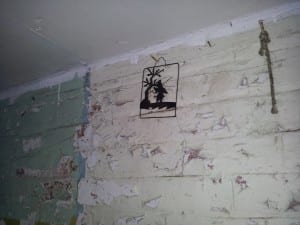This space – which I’ll call ‘The Fisherman’s Shed’ to avoid confusion – seems to me like a substitute. The West Parade house unfortunately lacks a cellar, but this shed gives some of the impressions of one. While it is not oppressive like a cellar, as it has windows and its odd little slapdash hole nestled in the wall, it has a very bleak feeling to it, a stark loneliness brought on (most likely) by the colours, the decay and neglect and its sheer bareness. However, the shelved anteroom in the living room (side note – what do we mean by living room – where we live most? Where there’s more living to be had?) exhibits these qualities too but doesn’t have the same feeling about it. I think it may be all to do with positioning. The side room of the living room (another meaning – is the living room exactly that – alive?) is next to the beating heart of the house. This shed however, is entirely separate (doubly so, as it is next door’s, but I’ll talk about the notion of trespass later). The dynamic I see between attic and cellar is that while an attic is part of a house, a cellar is part of the earth. It doesn’t belong to what is above it and is potentially infinite – especially in darkness. The shed, to me, is the house’s cellar facsimile – something other, not belonging and so, clothed in mystery. Its Spartan features speak of a fear to populate and furnish it – the house is not comfortable to populate and furnish it. The cobwebs and decay show that this space truly belongs to the outside world. Creatures inhabit it, alien to us in their ways; ‘The creatures moving about in the cellar are slower, less scampering, more mysterious’ (Bachelard, P19). Time and the elements have ravaged it – a pipe is torn from the wall, the paint flakes, a socket raped mercilessly by the onset of rust – this place does not belong to humanity, we are merely tolerated.
(The Fisherman’s Shed)
The other unsettling feeling here is the feeling of trespassing – not just in the florid and prosaic sense I just wrote about, but literally – this is next door’s shed. There is something fundamentally wrong about the feeling of trespassing, even if it’s legitimised somewhat in this situation. In the same manner that a burglary violating your home gives you an awful feeling of vulnerability, trespassing makes you vulnerable from a different perspective. A fear grips you – the fear of discovery. I think what it really boils down to is a human desire to belong and when we trespass – not necessarily into areas, but into groups or conversations as well, that need to belong isn’t being fulfilled.
References:
Bachelard, L, 1969 The Poetics of Space: Boston Mass: Beacon Press, p. 19. Available through: The University of Lincoln Blackboard website <blackboard.lincoln.ac.uk> [Accessed 25 January 2013]
